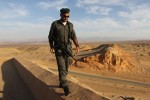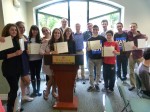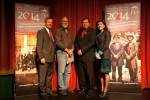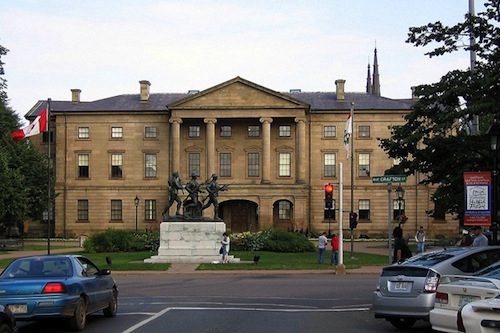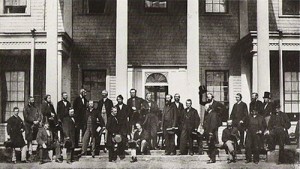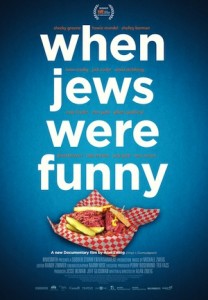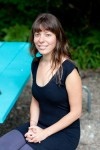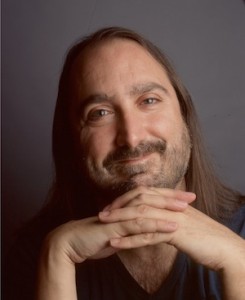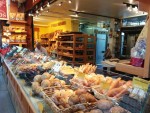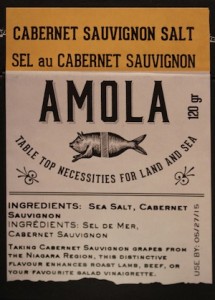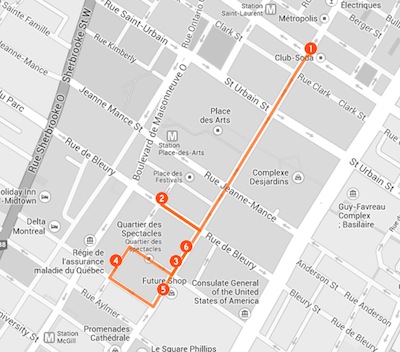Sara Dent of Young Agrarians, which hosts farm tours, potlucks, workshops and a website with networking tools like connecting retiring farmers with land to young farmers seeking it. (photo from Sara Dent)
Whether it’s visiting a farmers market, signing up for a CSA (community-supported agriculture) box or just paying attention to where the produce in the grocery store was grown, local and sustainable eating has been in the zeitgeist for nearly a decade and it shows no signs of flagging. For many North Americans, food has proven an accessible entry point into issues of consumption, environment, community and health. All this, of course, doesn’t happen by itself.
Meet Sara Dent, one of British Columbia’s behind-the-scenes farm organizers. Dent is the co-founder of Young Agrarians, a network and community that supports young farmers as they attempt to start and develop farming businesses. She is also starting to do farm business development consulting, and teaches workshops in permaculture, a design philosophy focused on long-term sustainability. On top of that, she maintains a photography blog, mainly documenting the farmers with whom she visits and works.
As anyone who speaks to Dent will soon realize, the vibrancy and growth of Young Agrarians can be largely attributed to her specific abilities: as a fundraiser, organizer and speaker. Dent is perhaps predisposed to seek respite from some of the harsher aspects of urbanization. Her parents relocated to Vancouver in the 1970s, seeking a healthier, less crowded environment.
In her twenties, Dent did administrative work for nongovernmental organizations around youth, social change and community building. But, in 2006, she said she was broke and decided to take a break from the city, volunteering on three farms over four months. That summer, a light bulb turned on. Since then, Dent has photographed and volunteered on dozens of farms, completed the Linnaea Ecological Garden Program on Cortes Island and become a certified permaculture design teacher. All through this period, she continued to do contract fundraising work.
“We want to look at agriculture as a dynamic entrepreneurial sector where people have many on-ramps to farming.… New farmers need to marry business skills with production skills. People are starting their farming careers in all different stages on the spectrum, with different levels of experience.”
But all this was just a warm-up to co-founding Young Agrarians, which was dreamed up in 2011. The group – which is a partnership with the Vancouver nonprofit Farm Folk City Folk – has turned into a vibrant community with regular activities for both farmers and for the interested public. The main target, however, remains building capacity with young farmers. Dent explained, “We want to look at agriculture as a dynamic entrepreneurial sector where people have many on-ramps to farming.… New farmers need to marry business skills with production skills. People are starting their farming careers in all different stages on the spectrum, with different levels of experience.”
Young Agrarians hosts farm tours, potlucks, workshops and a website with networking tools like connecting retiring farmers with land to young farmers seeking it. The next big project is building a program to offer business coaching for farmers and startups. That program will provide 20-50 hours of human resource support essentially free, or on a sliding scale.
In order to do this, and to expand Young Agrarians beyond its current B.C. focus, Dent is trying to broaden her funding base beyond goal-oriented grants from foundations that require specific program deliverables. According to Dent, a challenge for many NGOs is to raise enough funding for general operations. Eventually, she hopes, Young Agrarians will increase donations from individuals and through public events, which can more easily provide operating funds.
When asked whether starting her own farming business is in her future, Dent matter-of-factly said, “I have no equity. You can get 10 acres outside of Montreal for $100,000-$200,000. Those 10 acres cost one million in the Lower Mainland.”
Aside from the financial reality of buying land, Dent said that the farmers she works with don’t want her to stop being an organizer. As a person with a background in fundraising, and general macher qualities, the value she provides as a consultant and community builder may well exceed that of starting her own farm. And this is where she sees her future: Dent said that, in her 40s and 50s, she would like to make her primary living from consulting.
The term permaculture was coined in 1978 by Australian Bill Mollison as a contraction of “permanent agriculture.” The term has since expanded into a set of principles for all aspects of human planning, design and engineering, which emphasize long-term sustainability through modeling human systems on natural ecosystems. A common theme of permaculture designs are concentric zones around the home from the most frequently used herb and vegetable beds, to main cropping areas, to perennials, to the semi-wild and wild. Permaculture principles are applicable on multiple scales, from small gardens that only contain one or two zones to larger farms that contain all zones. Permaculture emphasizes maximum collection and storage of abundant resources (energy, water, calories) in order to be financially viable and sustain a year-round system.
Critics of permaculture contend that the concept has devolved into quaint urban gardens with herb spirals and flowers, instead of modeling economically viable production systems that grow food for the masses. Dent didn’t disagree, but emphasized that the incorporation of permaculture concepts into agriculture is fairly new territory, and can create success. “Things can get lost in the conceptual realm if people are trained in permaculture, but have no agricultural training,” she explained. “But the people that are hybridizing those models are having a lot of success…. Joel Salatin, a permaculture agriculturalist, is very much modeling that out on the ground.”
“On any sustainable organic farm, you’re going to want to have both annual and perennial systems running at the same time.”
An example of holistic management using a permaculture approach is to look at perennial plants as a savings account (longer maturity, high-value yield) and your annual plants as a chequing account (for cash flow in the early years of the business). “Farms right now can have really interesting diversified revenue streams, like cut flowers, edible flowers, herbs,” she said. “On any sustainable organic farm, you’re going to want to have both annual and perennial systems running at the same time. These are new territories in terms of practitioners being able to adapt and use the ideas together and in different combinations.”
Other permaculture concepts are on their way to becoming mainstream, said Dent. As concentrated areas of food production like the central valley of California face severe drought and uncertain climate changes, land contouring techniques like keylining and swales, which capture rainwater and soak it into the soil instead of allowing it to flow over the surface, will be essential, and will be incorporated widely, she said.
As for her Jewish heritage, Dent said that she does the work that she does because of the work that her grandmother did and that which her father did. “I very much come from an activist, Yiddish, left-wing, socialist family tradition. Those values, of culture, unions, education, affordable university, all of those things were things that my family fought for … my grandmother was a union organizer and was a member of the communist party.” Her family history, “from poverty to solidarity,” is a source of pride for Dent.
There are a handful of other Jewish food organizers that she gets to work with from time to time, as well. “As someone who very much grew up in a non-Jewish society, it’s nice to work with other people that have that shared cultural background,” she said.
For details on Young Agrarian activities, visit youngagrarians.org.
Maayan Kreitzman is a freelance writer living in Vancouver.

